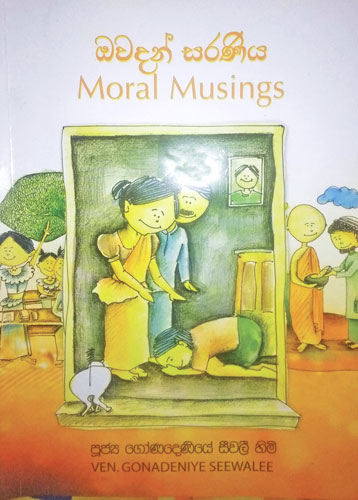The terms such as ‘counselling’, ‘teaching morals’, ‘dictums’, ‘words of wisdom’ and ‘maxims’ have given way to a wider range of communication meanings than their denotative meanings. Over the years, the human expression has given way to better living standards via poetic renderings of moral phrases in almost every known culture irrespective of the global differences in the orient and the occident.
In our own local human expressions, the poetic creations such as Lokopakaraya, Hitopadesaya, Loveda Sangarawa and Subasitaya have come to be known as household handbooks on poetic expressions on moral issues and good existential experiences that go beyond the mere cursory verbal advice. This tradition is observed as a continuous and necessary mode of creative expression ranging from children to adults.
Widely-travelled
 A few days ago, I had the chance of meeting a learned Buddhist priest. He is Venerable Gonadeniya Sivali Thera. He has travelled well and met people from various walks of life. For years, he had been writing Sinhala verses giving expression to good living factors. In the end, he had completed 100 Sinhala verses segmenting them to 10 topics.
A few days ago, I had the chance of meeting a learned Buddhist priest. He is Venerable Gonadeniya Sivali Thera. He has travelled well and met people from various walks of life. For years, he had been writing Sinhala verses giving expression to good living factors. In the end, he had completed 100 Sinhala verses segmenting them to 10 topics.
The title of the compilation of these verses goes as ‘Ovadan Saraniya’. The 100 simple and resourceful poems are translated into English by the well-known scholar cum journalist Dr Edwin Ariyadasa. As a reader, I found that the poems on those 10 topics are addressed mainly to children but transcends the barrier of narrow limitations.
The intention of these versifications is denoted as a necessity in our living conditions. The compiler priest regards his creative mission as a compelling need in the course of his training in Buddhist catechism and the legacy of the influence of classical oriental literature that laid down as a powerful knowledge-giving heritage.
Proper awareness
In the preface to the collection, the author notes: “Human life is a massive stream that is certainly affected by tensions that occur in such a variety of areas as education, vocations, houses and property, transport, trade diseases and religion. If we do not have proper awareness about all these issues that life has to face, life will become bitter.”
This paves the way for the reader to fathom the noble intention of the poet-priest. ‘Think of Others’ is the very first topic that goes as follows.
‘When you sit down
Don’t disturb anyone
Think well on this
Please sit well in a good manner.”
The themes reach a climax when the poetic expression goes as:
“When travelling
Do not litter the roads
Dear children, it is good
To be clean, body and mind.”
This versified advice is followed by the topic of ‘Your Duty’.
The versified duties are classified into three broad categories: the duties one performs as self duties, the duties performed for others and society.
‘Recognising Virtues’ is the next broad category of topics. This underlines factors such as virtues one learns from the day to day life inclusive of the family life, school and the knowledge acquired through various forms to religious texts listening to noble elders on themes such as good teachings and discourses. The verses culminate in a certain manner:
“The really educated person
Does not know jealousy
He loves all
He takes peace in his hand.”
The other topics of good wellbeing include themes such as ‘Understanding People’, ‘On Being Patient’, ‘Working with Knowledge’, ‘Understanding Humanism’, ‘Perceiving What is Good’ and ‘On Being Socialising’. On reading all the 100 verses both in Sinhala and English as a reader I felt that the social awareness of an individual could be well elevated as a creative teaching process. I sincerely feel that two forms of teaching could be achieved via this versified text.
Traditional forms
First, a teacher could utilise the text as a classroom lesson to teach language. Second, the teacher could utilise these verses and theatrics material to help gauge the intensity of a particular message sent by one person to another.
This communication form too could be utilised by a sound and visual media channel to clarify certain social issues one faces as trials and tribulations, in the very plane of existence. All in all, I felt that this book of verses, though traditional in form is nevertheless modern in the context, the message disseminated. Whether one agrees or not, we need to reconstruct our teaching and learning patterns.
This compilation, well illustrated, may enhance a better climate of opinion on contemporary social matters. Three university dons have adored the form and content of the resourceful versification. As Venerable Sivali Thera’s work goes beyond the barriers of race, religion and other forms of ethnic barriers, I wish that it would be appreciated by various groups of readers around the globe. Perhaps the meditative mood of the presentation could be improved as more and more readers are attracted.
As the poet-priest implies, he was inspired to write this book by the style of life, people presented on various occasions in his travels. As such, the book too could be discerned as a handbook for wellbeing.



Add new comment